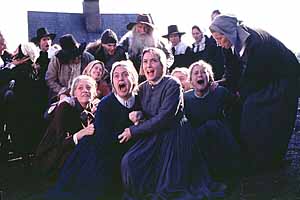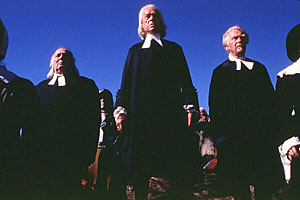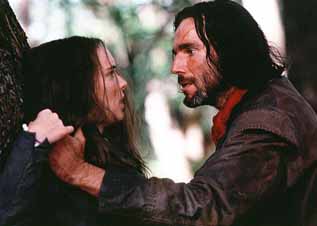






















|

|
But now the drama makes its Hollywood debut, opened up for the big screen and hardly the same play at all. The plot is essentially the same, but the filmmakers go for a substantially different feeling. Instead of creating a closed off, claustrophobic sense of a repressive society, imposed in part by the physical limitations of the stage, we get bright sunlight shining on the actors, with blue skies, fields and brooks, township streets and eerie forest glens. It's a startling change, and a change that the director Nicholas Hytner (The Madness of King George) and writer Arthur Miller negotiate deftly, weaving a story where claustrophobia and repression can find us even in wide open places.
|

Winona Ryder and the girls get hysterical.(©1996 20th Century Fox. All Rights Reserved.) |

The Crucible tells the story of what happened in Salem, Massachusetts in 1692, when 24 people were executed for witchery. The movie begins by taking us into the scene that starts the problems, a scene you won't find in the stage play--a midnight ceremony in the woods by a dozen or more girls. The camera moves with the girls as they run through the forest, capturing their giddy excitement. For most of the girls, the ceremony they conduct, led by a Haitian slave, is nothing more than a girlish prank where they reveal the names of the men that they secretly love. But for at least one of the girls, Abigail Williams (Winona Ryder), this ceremony is an opportunity to let her sexual frustration break loose. She kills a chicken and rubs blood on her face. Some girls scream in horror, others laugh, and others strip naked and begin to dance. Unfortunately for the girls, Reverend Parris (Bruce Davison) sees their shenanigans and breaks up their party. The girls scream and flee through the forest. But he has seen them and how can the girls cover-up their actions? By lying, of course, and saying they were consorting with the devil; for in the strange logic of this Puritanical society, confessing means you're exonerated. And before you know it, half the town is locked away in jail, accused of witchery, while judges from Boston, led by Judge Danforth (Paul Scofield), exact their lethal brand of justice.
|

Paul Scofield as Judge Danforth. (©1996 20th Century Fox. All Rights Reserved.)
|

Contrasted with the public spectacle of trials and executions, we also get the quieter personal moments in the Proctor household. As the object of Abigail's past affections, John Proctor (Daniel Day-Lewis) refuses to yield to her temptation. ("I will cut off my hand before I reach for you again," he says.) But staying true to his wife Elizabeth (Joan Allen) can be fatal in Salem in 1692, particularly when a hot-to-trot teenager (Ryder) pines for him and threatens to accuse his wife of witchery if he doesn't satisfy her own desires.
Opening up the play makes the girls seem smaller, but also more real. If you're going to The Crucible to see the hysterics of girls screaming "Witch!", you might be disappointed. The Crucible doesn't play these scenes for maximum melodramatic impact. Instead we see a town that doesn't by and large believe the girls, but finds they also can't disregard the claims of witchery either. With some members of the local clergy seeing the opportunity to seize lands that they can't take legally and other members attempting to cover-up what really happened in the woods, The Crucible becomes a terrifying tale of the failure of religion. In The Crucible religion is used like a sword for petty material gain by some and as a shroud for obscuring the truth by others. Even the death of townsfolk means little to some of the pious Salem clergy in power. We see petty bickering over firewood and frustration over fruitless meetings and the drama takes on a surprisingly contemporary ring to it.
It's no longer the same play that Miller wrote back in the '50s, when he used the Salem witch trials as a way of commenting on the witch hunt conducted by Senator McCarthy over communism in Hollywood. Now it's about corrupt politicians who are eager to take advantage of the people they are supposed to be serving. And it's about the way that narrow-minded people with fervent beliefs can make other more sensible people practically impotent--for fear that they won't be seen as politically correct. It's also about the way that finger-pointing can become a means of empowerment for the young or poor, a means to attract some attention and enact revenge.
Director Hynter and writer Miller succeed most strongly when they show how the events quickly snowball until the witch trials can't be stopped--even when few people actually believe the charges are true. As the judges encourage claims of witchery by alternating beatings with soft words of encouragement--and giving hallelujahs when the accused finally confess to having seen townsfolk consorting with the devil--we see just how easily the initial situation takes on a life of its own.
However, The Crucible is essentially still a mechanical play--the kind of drama you might get if you've drawn up character sketches and plotted out the whole thing before you started really writing the words and letting the characters come to life on their own. As a result, after seeing the movie I found myself much more intrigued by the ideas being carried by the drama than by the drama itself, which only occasionally becomes truly compelling. The Crucible is one of the best movies of the past year, but it's also the kind of movie that commands respect even if you're not particularly moved by it.

 A 20th Century Fox Release
A 20th Century Fox Release
|
 |
|
|





